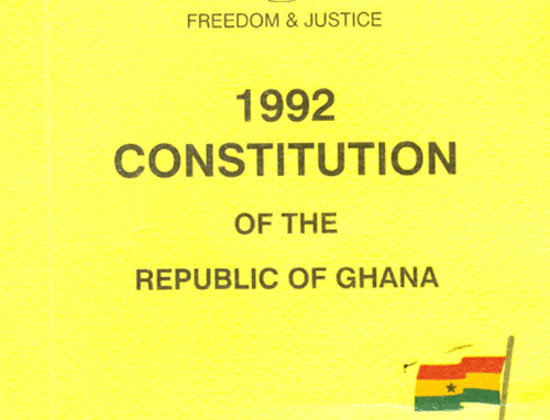The 1992 Constitution provides three unambiguous answers to the question of Citizenship by birth.
The 1st is found in Article 6(1) which provides:
“(1) Every person who, on the coming into force of this Constitution, is a citizen of Ghana by law shall continue to be a citizen of Ghana”.
This provision implies all persons who had acquired their Citizenship by birth through all existing laws before the 1992 Constitution (Pre-1992 Constitution Citizens by birth) are to continue their Citizenship through the same medium including by birth. So, all those who were Citizens by birth before the 1992 Constitution continued to be Ghanaians by birth.
The 2nd is found in Article 6 (2) which provides:
“Subject to the provisions of this Constitution, a person born in or outside Ghana after the coming into force of this Constitution, shall become a citizen of Ghana at the date of his birth if either of his parents or grandparents is or was a citizen of Ghana”
From the reading, the 2nd answer has some mandatory requirements which must be met by anyone born after the coming into force of the 1992 Constitution to be deemed to be a Citizen by birth (Post-1992 Constitution Citizens by birth)
1. One must have been born in or outside Ghana on or after the coming into force of the Constitution (that is on or after 7th January 1993) – where and when
2. That at the date of your birth, either of one’s parents or grandparents is or was a Ghanaian – to who
Article 6(2) is subject to other provisions of the Constitution paramount among same being Article 1(2) on the supremacy of the Constitution and the fact that any other law found to be inconsistent with any provision (including Article 6(2)) to the extent of the inconsistency be void. Therefore, the provisions of Article 6(2) are the ONLY requirements one born on or after 7th January 1993 must meet in proof of his/her Citizenship by birth (as a Post-1992 Constitution Citizen by birth).
The 3rd answer is found in Article 6(3) which provides “(3) A child of not more than seven years of age found in Ghana whose parents are not known shall be presumed to be a citizen of Ghana by birth.”
In respect of Article 6(1), to decide whether one had acquired Citizenship by birth deserving of continuation, the Citizenship Act, 2000 (Act 591) Sections 2 to 6 provide specifically for such determination over time frames from 6th March 1957 to 6th January 1993. Invariably, the various permutations seek the fulfilment of the same requirements under Article 6(2) that is one is/was born in/outside Ghana and either parents/grandparents were citizens of Ghana. (Except the period on or before 6th March 1957 but before 22nd August 1969 which additionally allowed citizenship of parents by registration or naturalisation).
Therefore, there are no ambiguities or difficulties on how one can be said to be a Citizen by birth.
However, the 1992 Constitution fell short of providing for how one should offer evidence in respect of the requirements for Citizenship by birth. It only provided for the legal burden one must discharge in that respect.
Over the years, various secondary statutory documents such as Passport, Ghana Card, Voter ID Card (New & Old) have been offered and accepted as offering some evidence of citizenship of Ghana. But the Citizenship roots for these documents have not been limited to Citizenship by birth. One can acquire these documents if he/she is a citizen by adoption, naturalisation and registration. The ONLY statutory document that provides prima facie evidence for the determination of Citizenship by birth is and remains the Birth Certificate.
The Birth Certificate simpliciter does not confer citizenship. On it will be information in respect of "date, where and to whom the holder was born". And those are all one needs in the assessment of Citizenship by birth either by Article 6(1) or (2).
To reject a birth certificate as not offering evidence of citizenship for the purposes of any Constitutional Right of a Citizen is not only to deny the rights of a large group of persons who have acquired their Citizenship by birth but to also subject their citizenship to unnecessary questioning.
***

The Writer, Richard Nunekpeku is a lawyer at E.L Agbemava Law Office. Richard.nunekpeku@outlook.com
Latest Stories
-
Expansion Drive: Takoradi Technical University increases faculties
3 hours -
SHS heads demand payment of outstanding funds before reopening of schools
4 hours -
We thank God for the 2024 general elections – Akufo-Addo
4 hours -
Coconut Grove Beach Resort marks 30 years of excellence with memorable 9 lessons & carols service
4 hours -
WAFU B U-17 Girls’ Cup: Black Maidens beat Nigeria on penalties to win inaugral tournament
5 hours -
Real Madrid beat Sevilla to keep pressure on leaders Atletico
6 hours -
Liverpool put six past Spurs to go four points clear
6 hours -
Manchester United lose 3-0 at home to Bournemouth yet again
6 hours -
CHAN 2024Q: ‘It’s still an open game’ – Didi on Ghana’s draw with Nigeria
6 hours -
CHAN 2024Q: Ghana’s Black Galaxies held by Nigeria in first-leg tie
7 hours -
Dr Nduom hopeful defunct GN bank will be restored under Mahama administration
8 hours -
Bridget Bonnie celebrates NDC Victory, champions hope for women and youth
8 hours -
Shamima Muslim urges youth to lead Ghana’s renewal at 18Plus4NDC anniversary
9 hours -
Akufo-Addo condemns post-election violence, blames NDC
9 hours -
DAMC, Free Food Company, to distribute 10,000 packs of food to street kids
10 hours

